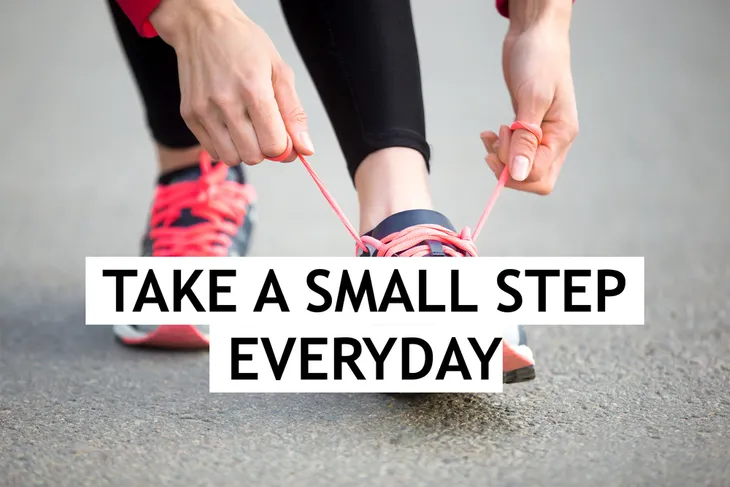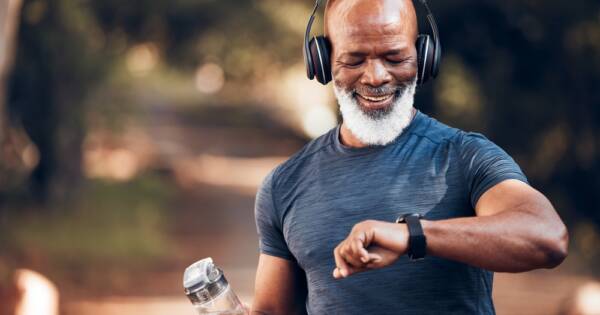Whether you’re sweating it out in a hot yoga class, beating feet on a long distance, or powering through a high octane spin class—the urge to quit will likely crop up if you feel like you’re hitting a hard brick wall. But rather than simply throwing in the towel, it is possible to see your workout through if you scale back your speed and intensity until you get your mojo back.
Here are eight effective tips for beating the urge to call in quits on your workout…
Ban Negative Self-Talk
It’s easy to get down on yourself if you feel exhausted 10-minutes into a run. In fact, Tamar E. Chansky, psychologist and author of the book, Freeing Yourself From Anxiety, claims that negative self-talk over the long-term leads to heightened stress levels and depression.
When we use negative self-talk (i.e., “I’ll always be out of shape”), our mindset and attitude toward the activity at hand suffers. Luckily, the opposite is also true—if you ban the negative and focus on the positive (i.e., “This makes me feel great”) you’ll stay encouraged and be less prone to calling it quits.
Pinpoint Your Motivation
We’re all motivated to exercise for very personal reasons—muscle building, fat loss, increased energy, to lessen the symptoms of a chronic health condition, or an upcoming wedding. This is why pinpointing your own personal motivation can help you battle through the urge to give up and keep your eye on the prize (the end result).
Be Present in the Moment
Hitting that future wall—the one 30-minutes ahead of you—is hard to blast through if you’re only half way into a difficult workout. If you’re muscles start to burn, those remaining 30-minutes can feel impossible.
However, if you take a mindful approach to your workout by focusing on the present, you can take the focus off the end game and narrow it down to zone in on each muscle movement (i.e., pedal rotation or foot strike), which will calm your mind and heart rate, and motivate you to see your workout through.
Find Your Workout Beat
A research study from Brunel University’s School of Sport and Education in the UK draws a direct link between music and increased physical endurance. The study monitored 30 participants as they used a treadmill to exercise.
Participants who exercised to motivational rock or pop music were not only more prone to keep time to the beat of the tune—15-percent reported increased feelings of pleasure, greater positivity, and less physical exhaustion even when working out at high intensities.
Evoke Past Successes
We all hit roadblocks on the road to success, and most of us know that the really rewarding things in life don’t come easy. That’s why recalling a past success (i.e., a promotion, running a successful business, or even recalling a fruitful workout day) can keep you striving in your workouts. The realization that you’ve already succeeded in life—makes it realistic that you can do so again.
Find the Fun in Working Out
Many of us focus on the practicalities of exercise and forget that it’s actually a fun way to spend our time. For instance, team sports provide decent exercise, but they also build camaraderie and teach us to function as a team.
For instance, when I play ultimate Frisbee with my coworkers, I rely on their positivity and inside jokes to keep me motivated and positive and focused on the game. So feel free to come up with hilarious names for plays and nicknames for teammates to keep the game lighthearted and fun for everyone involved.
Be Willing to Face Adversity
It’s human nature to take flight in the face of adversity. And while pain and injuries should never be ignored, common workout obstacles (i.e., fatigue, bad weather, or muscle burn) can be faced and conquered if you don’t seek escape at the first signs of difficulty.
Listen to Your Body
Everyone likes to find an excuse to skip a run when it’s cold outside. However, there’s a big difference between workout obstacles and workout common sense. For instance, if you find yourself in the type of physical pain that will cause an injury, you should stop exercise immediately. With practice, you will be capable of listening to and knowing what’s best for your body.











